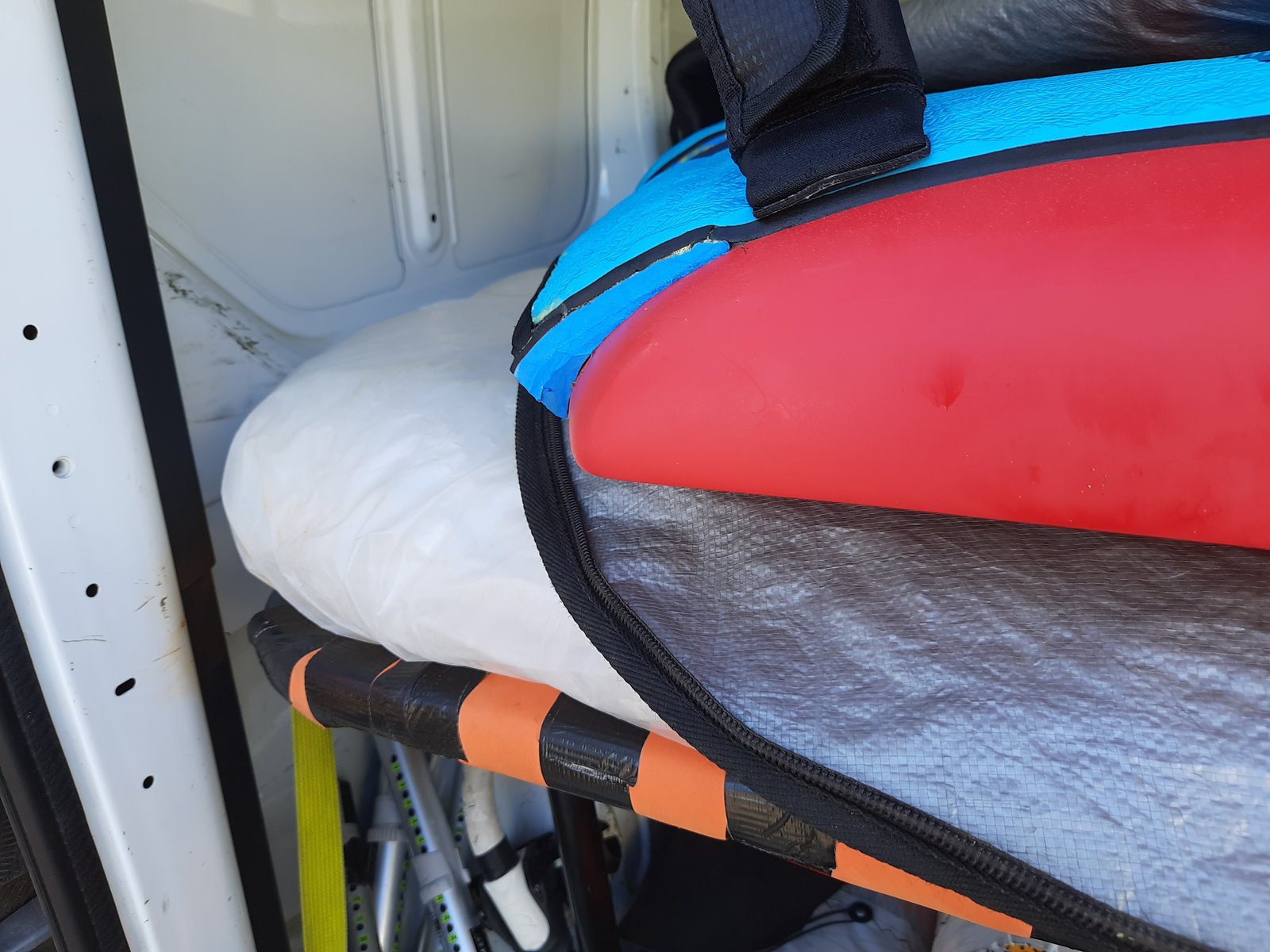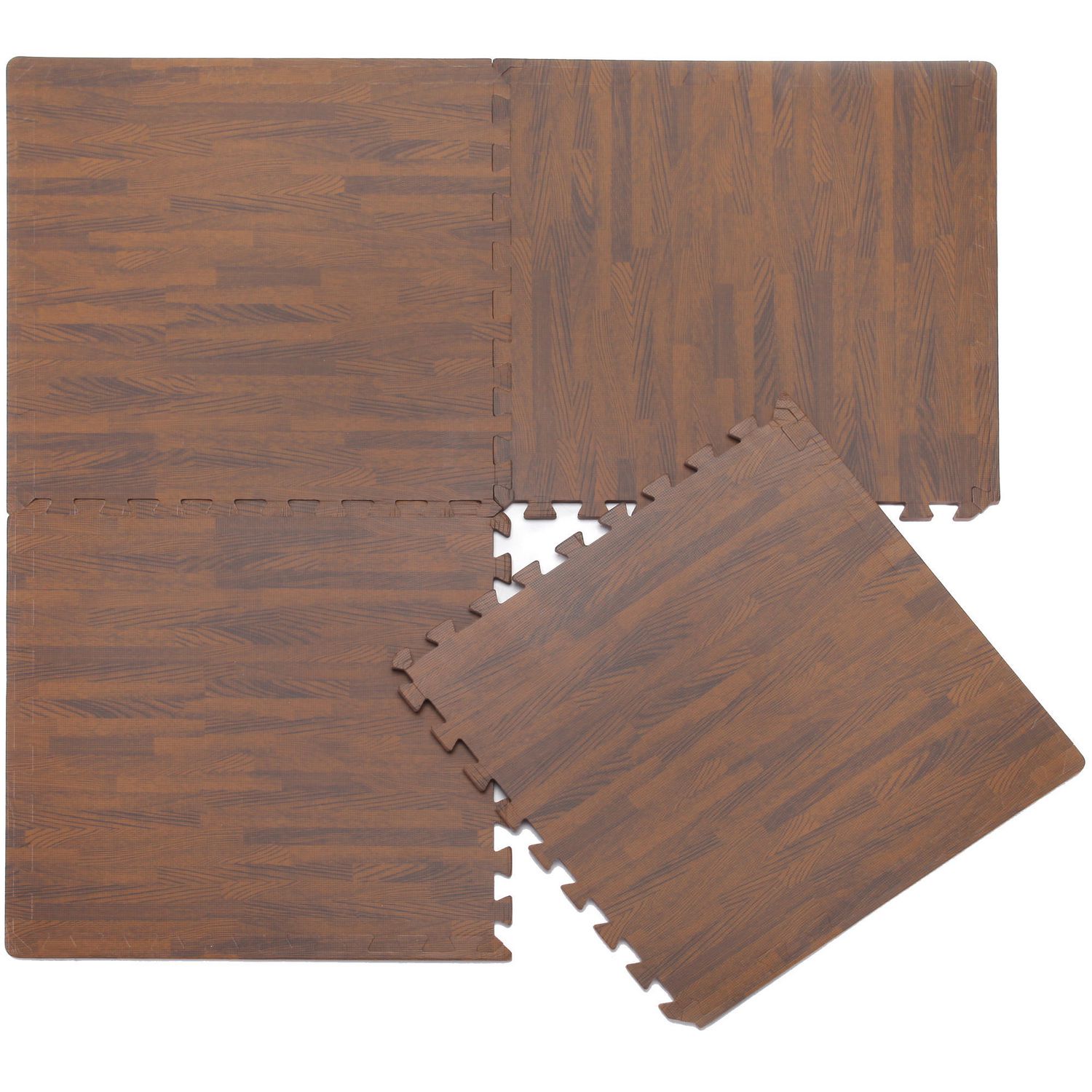

Has anyone made something similar to this using EVA foam blocks or sheets?
source: www.windsurfing33.com/forum/viewtopic.php?f=42&t=122272&p=874512#p874512
Yes, last year I made pads out out a yoga block and rubber cemented them to my 72cm board to help with getting out on the rails for upwinding with large sails and light winds. They worked great, though I have since moved on to a much shorter, wider board I found the untextured foam blocks were fairly slick so ideally the foam blocks should have some texture for grip. I also added some kiteboard footbeds under the footstraps to help add a bit more width too. The current owner still has them on the board, but he uses it in much higher wind with smaller sails where board width is far less important.

 You could use foam floor tiles. Shape/Cut with a flat soldering tip. I used foam floor tiles as pads for the nose of my freeride board, dollar store contact cement is good enough.
You could use foam floor tiles. Shape/Cut with a flat soldering tip. I used foam floor tiles as pads for the nose of my freeride board, dollar store contact cement is good enough.
Yes, last year I made pads out out a yoga block and rubber cemented them to my 72cm board to help with getting out on the rails for upwinding with large sails and light winds. They worked great, though I have since moved on to a much shorter, wider board I found the untextured foam blocks were fairly slick so ideally the foam blocks should have some texture for grip. I also added some kiteboard footbeds under the footstraps to help add a bit more width too. The current owner still has them on the board, but he uses it in much higher wind with smaller sails where board width is far less important.

Did you shape the blocks with coarse sandpaper or some other way? I was going to tuck them under the current deck pads similar to the pic and then reglue the original pads back down.
Yes I used sandpaper and a rasp, EVA is very easy to work with, almost too easy. I tried to lift the exsting pads, but couldn't peel them up cleanly.
the only eva sheet i could find with decent hardness was from a shoe repairer.
i used the hard shoe foam over a thicker/softer floor tile.
Yes I used sandpaper and a rasp, EVA is very easy to work with, almost too easy. I tried to lift the exsting pads, but couldn't peel them up cleanly.
Thanks. The rasp idea is a good one.
Thinking out loud here - I think I've seen eva used as a sandwich material on board builds - so, in theory, if I made an extender that fits on the deck, I could add a bit of glass on it? Idea being to have enough structure to screw down to the foot strap screws similar to the Starboard set. Or better to use 2 part foam?
Use ABS foam for the extender then glass over that?
I'll see if I can find some where the shipping isn't outrageous. Still pondering eva, though.
Use ABS foam for the extender then glass over that?
I'll see if I can find some where the shipping isn't outrageous. Still pondering eva, though.
Im the guy who used eva as sandwich material. But i used a high density and was only 3mm thick so it couldn't squash much . If you were to use a thicker block i think it would squash and would need a lot of glassing over . The hd eva is also quite heavy . There would be harder lighter foams that would be better. I think Bunnings sells a hard foam sheet .
Brain storming here.
Use expanding TITE foam (for windows and doors) save time on the getting the contour of the board right. Simple enough PPE, mask area, spray, cure, trim. I've never worked with it; is there anyone with experience on this type of foam?
www.loctiteproducts.com/en/products/build/polyurethane-foam/tite_foam_windowdoorsealant.html
Heat mold 3mm ABS to the board. Then glass the top of it. Remove and glass the bottom.
Then glue EVA to it and shape appropriately.
Basically make a mini sandwich layer secured by the footstrap screws.
Brain storming here.
Use expanding TITE foam (for windows and doors) save time on the getting the contour of the board right. Simple enough PPE, mask area, spray, cure, trim. I've never worked with it; is there anyone with experience on this type of foam?
www.loctiteproducts.com/en/products/build/polyurethane-foam/tite_foam_windowdoorsealant.html
Yes- I've worked with it on a windsurfing related project. That's why I'm using two part. The window/door sealant has a very inconsistent internal texture with sizable voids. Better off gluing up some EPS foam and going at that if you don't have two part handy. I can see why it seems like it would work - I would have, too, prior to my experience. Nonetheless, appreciate the suggestion.
Imax1, thanks for the input. Gives me some things to think about. GrantMac, good idea but may be easier to use some spare pvc foam I have around. I like the idea though if I can find a sheet of it somewhere.
Since some time, I turn around the idea to 3D print some heel extensions (someting like the starboard ones). Not sure that 3D printing would be better than foam blocks, but I like the idea. However I block on how to easily measure and then model in the CAD software the deck shape.
Sand casting.
Put the board upside down on a beach or box of sand.
Board is level with the sand; deck is buried (board is upside down)
Extract the board.
You'll will be left with an impression of board.
Block of the area you want to fill.
Fill with the same material that is used to repair a soft deck or whatever you like.
Sand casting.
Put the board upside down on a beach or box of sand.
Board is level with the sand; deck is buried (board is upside down)
Extract the board.
You'll will be left with an impression of board.
Block of the area you want to fill.
Fill with the same material that is used to repair a soft deck or whatever you like.
Thanks for the proposal. I have difficulties the understand the last steps.
OK for "Put the board upside down on a beach or box of sand / Board is level with the sand; deck is buried (board is upside down) / Extract the board / You'll will be left with an impression of board"
Not sure for "Block of the area you want to fill" : is it to "limit the casting size" by putting sort of plank(s) to isolate the rear of board and set borders to the casting ?
Then don't understand "Fill with the same material that is used to repair a soft deck or whatever you like" : is it to pour some "filler" in the hole ? Which type of material ?
Yes limit the area for casting.
Make vertical dividers out of carboard place on the sand once you had made the cast of the board. These dividers will partition the areas where you want to make the mold. In this instance just around the footstrap area for the heel extension.
Filling:
boardlady.com/materials.htm - Bottom of page
"To reinforce fractured EPS foam, I use a Marine Urethane foam by Evercoat. As opposed to the stuff from the hardware store that comes in a spray can, this foam does set up hard.For filling, when I really, truly do not want to have to deal with bubbles, I use an Epoxy filler by Interlux, "VC Watertite"
Using this mixture fill in the partition area for your heel extension. The fill will become the heel extension, once its harden. Sand/Glass and paint.
Yes limit the area for casting.
Make vertical dividers out of carboard place on the sand once you had made the cast of the board. These dividers will partition the areas where you want to make the mold. In this instance just around the footstrap area for the heel extension.
Filling:
boardlady.com/materials.htm - Bottom of page
"To reinforce fractured EPS foam, I use a Marine Urethane foam by Evercoat. As opposed to the stuff from the hardware store that comes in a spray can, this foam does set up hard.For filling, when I really, truly do not want to have to deal with bubbles, I use an Epoxy filler by Interlux, "VC Watertite"
Using this mixture fill in the partition area for your heel extension. The fill will become the heel extension, once its harden. Sand/Glass and paint.
Thanks for the complements. I understand the process now. And I bookmark the website boardlady.com it looks like really interesting for all type of board / composite repairs :-)
jmf1:
I'm rethinking the sand cast method; using Epoxy filler is overkill and expensive.
EVA foam is the better method.
Working with EVA foam sheets: